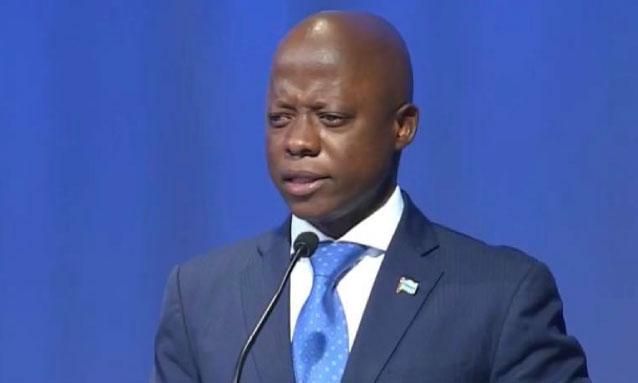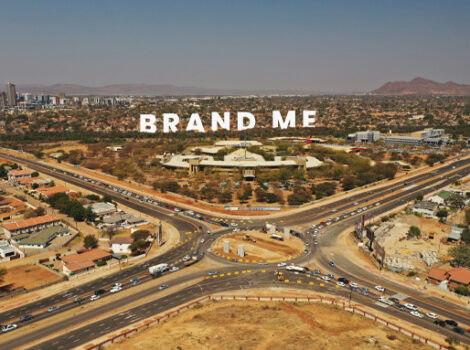
Back in July, the Sunday Standard ran an article about the Minister of Infrastructure and Housing Development, Mmusi Kgafela being concerned about the lack of proper digital systems across government departments. Minister Kgafela was particularly unhappy about how data is captured and stored by most government departments and this resonated with us. We have, in fact, run two articles; Botswana is not a paperless country and Certifying paperwork is wasting time, money and resources, both of which tie in with the Minister’s sentiments.
Kgafela noted that there is a serious challenge of accountability and negligence resulting in unnecessary mistakes which could be avoided if people used modern technology. He pointed an accusing finger at some people in senior positions at various government departments whom he said have a serious problem of forgetfulness, hence the many errors committed.
“Technology is so advanced that there is no need any more to rely on the brain or capacity to remember. If you use the latest technology and software you will have no valid reasons to claim forgetfulness. The old way of doing things through paperwork is so outdated and very unreliable,” he said.
The minister further highlighted there have been instances where money mysteriously disappeared or was reported to have been lost because of poor documentation. In some instances, he said expensive equipment has been purchased but not used while some buildings go years without maintenance, left to rot even with funds availed to stay on top of their maintenance. Kgafela said that while touring the country on a mission to inspect projects, they learnt that some government schools such as Ghanzi Senior Secondary School had not been maintained for decades, which means the Government will still have to shell out a small fortune to restore them.
“These are some of the many challenges we have in the construction industry. The unexpected coming of COVID 19 has in a way also been an eye-opener and has taught us to do things right by our people. We have decided as a government that we will procure locally and manufacture locally because we want to sustain our economy by way of ensuring that it is in the hands of Batswana”, he said.
He admitted, however, that although most of the projects running across the country are a success story, some were very shoddy, leading to unnecessary delays. He stated that while some structures are not managed by his ministry, considering that ministries do own maintenance facilities, respective ministries sometimes request that the ministry of Infrastructure and Housing Development take over and address dilapidated buildings.
He said it becomes too much of a challenge when they realise that the same ministries had not requested funding for maintenance, which leads to them being excluded from the budget allocation. The Minister said they would continue engaging the private sector and allocate works to Batswana-owned contractors despite the realisation the same contractors deliberately inflate prices at the mention of government tenders.
He added;
“We have foreign contractors who are determined as some of them are the best builders. We wish our local contractors would work well with them and learn from them. In the near future, we will have to unbundle projects so that both local and foreign-owned companies benefit. I must assure you that we are doing our best and in good faith. You are our checks and balances, and so if you see any inefficiencies kindly let us know,” said Minister Kgafela.
YourBotswana view…
Minister Kgafela’s talking points:
Challenge of accountability and negligence – The minister rightfully attributed unnecessary mistakes to the lack of modern technology. He also shone the light on certain senior government officials being part of the issue. We feel there may be a more sinister reason for officials shunning modern technology. Some of these so-called superiors are very long in the tooth and stuck in their ways. But scratch beneath the surface and you’ll find that the problem goes far beyond the lack of accountability and negligence, both of which are rampant across government departments. The issue is compounded by not just out of touch officials but also corruption, the greasing of palms for jobs and tenders, and the employment of clueless people hired not based on merit but rather who they know.
These old foggies who claim forgetfulness yet reject modern technology cling desperately to archaic paper-based systems because technology would expose their inadequacies, and there’d be nowhere to hide. While hard copies are good for back-up, it’s very common to hear documents ‘have been lost’ in government departments. With fit-for-purpose digital systems in place, we wouldn’t be here having this conversation because the Government would have an irrefutable ‘paper’ trail with all data captured. Any alterations made would be recorded, making it a whole lot easier to trace back any shady dealings to the culprits. So, it shouldn’t be up to these officials but the Government to ensure we start phasing out our over-reliance on paper-based systems and transition to electronic systems.
This would help us function in a more efficient manner, do our bit to save the planet, keep records more securely and realise Botswana’s aspiration of joining the 4th industrial revolution.
The mysterious disappearance of money would slowly become a thing of the past as long as the data was captured correctly. Where the responsible parties failed to do their part, they would easily be identified and held accountable. All too often, we hear of expensive equipment being purchased but not being used, a total waste of the taxpayers’ money. In many instances, these materials are poorly documented, allowing crooked officials to either steal or sell them on for a tidy price that goes to lining their already bloated pockets. And because there are no proper filing systems, nobody is any the wiser and the rot continues.
The lack of maintenance is quite frankly appalling and an embarrassment! The government spends hideous amounts of the taxpayers’ money building expensive buildings that are then left to rot. Where’s the sense in that?! Walk into any government building and chances are you’ll be confronted with cracked tiles, ceilings hanging so low they risk collapsing on customers, electric wires hanging from the rafters and all over the floors – I mean, I could go on and on. And some of these buildings are usually not even a decade old but will never have been maintained since being constructed. My question is, what exactly do government facilities managers do?!? Why are there no Health and Safety protocols that are governed by law? Where do the councils fit in all of this and shouldn’t they be held accountable?
Botswana is very lucky because Batswana are not litigious people. But some day, this will change when someone with exposure and insight is seriously injured and sues the Government. And then it catches on and people look for all these death traps to use to take the Government to the cleaners. And it’s not just in government offices either. You only have to walk around to see great big gaping holes and cracked, uneven paving with no warning signs whatsoever. In some countries such as the UK, lawyers advertise to represent people who’ve injured themselves at work or in public spaces that fall within council jurisdictions because these are serious health and safety hazards. These types of claims even have a slogan of sorts; “where there’s a blame, there’s a claim!”. So, these lawsuits keep governments and their councils on their toes. The minute you report a fault such as exposed electrical wires to the facilities manager, you blink and it’s fixed. Botswana could do well to watch and learn.
The drive to engage Batswana contractors regardless of the quality of their work comes over as just ticking boxes to say oh look, we’re embarking on a huge drive to empower Batswana. In my humble opinion, this is very damaging. As it stands, the murky waters of government tender issuing processes are leaving a very bitter taste in many Batswana’s mouths. Adding this wholly citizen-owned caveat to it all has the potential to impede progress and only exacerbate the rampant self-entitled attitude we have in Botswana.
The Government, on the one hand, is trying to lure investors to Botswana and on the other saying all the tenders we have on offer are reserved for the citizens – a precarious balancing act that I strongly believe the Government needs to find a meaningful and sustainable solution to. By his own admission, Minister Kgafela says citizen-run projects often show poor workmanship and are bogged down in heavy delays. This is a delicate balancing act for the Government – do you persist with this pro-citizen empowerment campaign even when they don’t measure up or do you plug the gaps with investors where skillsets and quality fall short locally? Do you risk alienating investors with caveats that dictate they give up a huge stake of their company to ill-equipped locals with weak to no work ethics? I leave it to the authorities to mull that over.
But personally, while I do support citizen empowerment, I believe strongly that before anybody is awarded a tender, they need to be thoroughly vetted to within an inch of their lives. After all, the main objective is to award the job the best man/woman – or at least it should be. Also, question marks should be raised when the same people repeatedly win government tenders to the extent of gaining the moniker ‘tenderpreneurs’. Why not shake up the tender system and award the job to the best ‘man’? Surely a little competition is healthy and would go a long way to ensure all applicants bring their ‘A game’ to snag the much-coveted tender? Projects submitted are often shoddy and overrun by months if not years, running into millions of Pula beyond their original cost. Going with the best man for the job would surely guard against this?
I would urge the Government to clean up its image and shrug off the idea that its marketing and procurement divisions are the most corrupt departments in Botswana by ticking the following for each government tender awarded:
- Is this person up to the job?
- Do they have a portfolio that showcases their previous projects?
- Are their previous clients reachable to secure testimonials?
- Do these contractors have the relevant qualifications, skills and experience?
- Can the candidate submit CVs and certificates?
- Does the candidate’s proposal tie in with the tender? Is it viable and feasible?
This would guard against jobs going to the wrong people. Of course, some would still fall through the cracks with all the wide-spread corruption and rampant greed that reign supreme in this country. But to be frank, like Minister Kgafela said; with digital systems in place, procedures would be fairer and more open, and there would be less suspicion and cynicism where the allocation of tenders is concerned. Imagine a ‘futuristic’ Botswana where the tender system was fairer, more open and digitised!
Go to www.botswanagovernmenttenders.co.bw > click tender to learn more and apply > attach CV, qualifications, portfolio and supporting certificates > submit.
Click here to check progress
Not only would it save time and energy, but it would also remove the air of suspicion, capture everything and store it securely, cutting out Botswana’s penchant for face-to-face interaction, which wastes time and money. I’ve lost count of the friends and loved ones who’ve been told their applications, files, documents etc had mysteriously disappeared, never to be found again. This happens over and over again, with the Government official flippantly telling you to simply apply again.
Minister Kgafela’s assertion that while some structures are not managed by his ministry, considering that ministries do own maintenance facilities, respective ministries sometimes request that the ministry of Infrastructure and Housing Development take over and address dilapidated buildings is shocking but not unique. The minister should put his foot down and instruct these people to take responsibility. Often, in Botswana’s workplace, people prefer to ‘muck in’ and share responsibilities, with no real ‘person specification’ for each role. This tends to very quickly descend into the hot mess that we see in most government departments. I believe this way of doing things works fantastically for the deadwood because they can hide in plain sight. There’s nobody to blame because everyone is shifting the blame onto the next person. I’m no expert but to my mind, stripping these departments right back and assigning clear-cut roles to qualified people would boost accountability and productivity. The roles could also do with streamlining and clearly defining the perimeters of the positions’ remits. If those responsible fail, the government should quit the softly-softly approach, fire and re-hire those who are up to the job! Simple.
The Minister said they would continue engaging the private sector and allocate works to Batswana-owned contractors despite the realisation the same contractors deliberately inflate prices at the mention of government tenders. What is even more shocking is the fact that the Government accepts the fact that it’s being held to ransom by clueless amateurs who submit subpar work. Can the Government not have experts assess the scale of these projects and pre-determine a guiding price which would help determine the final price? This is probably a simplistic way of viewing it, but surely that would weed out the time-wasters and chancers whose sole focus is on the jackpot? The same chancers who will often not have the skills for the very tenders they win and sub-contract to God knows who – sometimes even across the border, defying the Government’s drive to empower citizen-owned companies.
“We have foreign contractors who are determined as some of them are the best builders. We wish our local contractors would work well with them and learn from them. In the near future, we will have to unbundle projects so that both local and foreign-owned companies benefit. I must assure you that we are doing our best and in good faith. You are our checks and balances, and so if you see any inefficiencies kindly let us know,” Minister Kgafela concluded.
Well, in response to Minister Kgafela; this opinion piece serves as our feedback to not just your ministry but the Government as a whole. We can only hope that whatever is being ‘unbundled’ does benefit both the local and foreign-owned companies, with the jobs awarded based on merit, not who you know, not the cheapest and least of all, not driven by corrupt practices that enable the greasing of many a palm.
Reference: http://www.sundaystandard.info/minister-kgafela-bemoans-poor-management-collation-of-govt-data/



